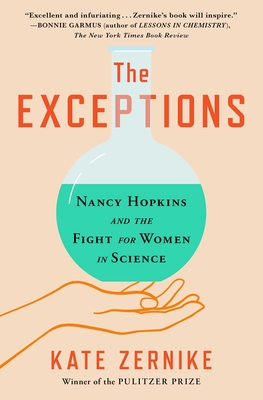The Exceptions: Nancy Hopkins, Mit, and the Fight for Women in Science

The Exceptions: Nancy Hopkins, Mit, and the Fight for Women in Science
"Riveting." --Siddhartha Mukherjee, author of The Gene In 1963, a female student was attending a lecture given by Nobel Prize winner James Watson, then tenured at Harvard. At nineteen, she was struggling to define her future. She had given herself just ten years to fulfill her professional ambitions before starting the family she was expected to have. For women at that time, a future on the usual path of academic science was unimaginable--but during that lecture, young Nancy Hopkins fell in love with the promise of genetics. Confidently believing science to be a pure meritocracy, she embarked on a career. In 1999, Hopkins, now a noted molecular geneticist and cancer researcher at MIT, divorced and childless, found herself underpaid and denied the credit and resources given to men of lesser rank. Galvanized by the flagrant favoritism, Hopkins led a group of sixteen women on the faculty in a campaign that prompted MIT to make the historic admission that it had long discriminated against its female scientists. The sixteen women were a formidable group: their work has advanced our understanding of everything from cancer to geology, from fossil fuels to the inner workings of the human brain. And their work to highlight what they called "21st-century discrimination"--a subtle, stubborn, often unconscious bias--set off a national reckoning with the pervasive sexism in science. From the Pulitzer Prize-winning journalist who broke the story, The Exceptions chronicles groundbreaking science and a history-making fight for equal opportunity. It is the "excellent and infuriating" (The New York Times) story of how this group of determined, brilliant women used the power of the collective and the tools of science to inspire ongoing radical change. And it offers an intimate look at the passion that drives discovery, and a rare glimpse into the competitive, hierarchical world of elite science--and the women who dared to challenge it.
PRP: 148.12 Lei
Acesta este Prețul Recomandat de Producător. Prețul de vânzare al produsului este afișat mai jos.
133.31Lei
133.31Lei
148.12 LeiLivrare in 2-4 saptamani
Descrierea produsului
"Riveting." --Siddhartha Mukherjee, author of The Gene In 1963, a female student was attending a lecture given by Nobel Prize winner James Watson, then tenured at Harvard. At nineteen, she was struggling to define her future. She had given herself just ten years to fulfill her professional ambitions before starting the family she was expected to have. For women at that time, a future on the usual path of academic science was unimaginable--but during that lecture, young Nancy Hopkins fell in love with the promise of genetics. Confidently believing science to be a pure meritocracy, she embarked on a career. In 1999, Hopkins, now a noted molecular geneticist and cancer researcher at MIT, divorced and childless, found herself underpaid and denied the credit and resources given to men of lesser rank. Galvanized by the flagrant favoritism, Hopkins led a group of sixteen women on the faculty in a campaign that prompted MIT to make the historic admission that it had long discriminated against its female scientists. The sixteen women were a formidable group: their work has advanced our understanding of everything from cancer to geology, from fossil fuels to the inner workings of the human brain. And their work to highlight what they called "21st-century discrimination"--a subtle, stubborn, often unconscious bias--set off a national reckoning with the pervasive sexism in science. From the Pulitzer Prize-winning journalist who broke the story, The Exceptions chronicles groundbreaking science and a history-making fight for equal opportunity. It is the "excellent and infuriating" (The New York Times) story of how this group of determined, brilliant women used the power of the collective and the tools of science to inspire ongoing radical change. And it offers an intimate look at the passion that drives discovery, and a rare glimpse into the competitive, hierarchical world of elite science--and the women who dared to challenge it.
Detaliile produsului










